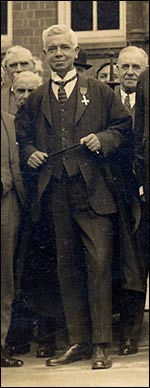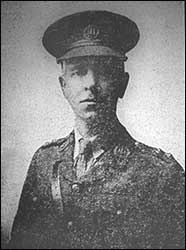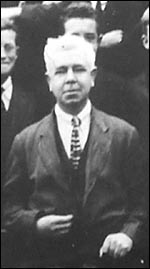 |
|
Mr Perkins
|
Mr Leonard Perkins, M.B.E., B.Sc., whose death occurred rather suddenly at 12.15p.m. on Monday, was a schoolmaster for whom his pupils, both in school days and after, had an affectionate regard. He was a man of scholarly attainments, and made his mark in public life, but the simple bond by which he was the friend of his “boys and girls” and they the friends of him was the distinctive contribution that he made to the story of Rushden, in the last 34 years. It mattered less that he was an expert in various branches of his craft, or twice the Chairman of the Rushden Urban District Council—it certainly mattered less to him.
Towards the end of last year a breakdown in health compelled Mr Perkins to leave his duties as headmaster of the Intermediate School and enter a London hospital, where on October 15 he underwent a serious operation. Returning home after five weeks, he was able to go out occasionally, and even resumed his place in the school for a day or two. He also attended a Christmas party there, but it appears that he had ventured too much, and in January he weakened disturbingly. Even so, his family were not prepared for the early termination that came on Monday, when he passed away in his sleep at School House, his residence in Newton-road.
Sixty-six years of age, Mr Perkins was a native of Leeds, and studied for the teaching profession at the Borough-road College, London, both at its original site and after its removal to Isleworth. This was in 1890-91, and Mr Perkins afterwards taught at the Central Higher Grade School, Leeds. As a young man he was a keen Rugby footballer in the ranks of the Headingley Club.
Author of Books
It was in March 1904, that he moved to Rushden and became headmaster of the Newton-road Council School. He remained at Newton-road until 1925 when he became head of the new Intermediate School (the only one of its kind in the county), holding this position up to the time of his death.
An expert in mathematics, he wrote several text books on the subject, and did much to foster new methods of teaching, making use of graphs to an extent not hitherto practised. His principal book, “Viagraph Mathematics,” was published by Messrs Arnold, of Leeds, and quite recently he had been engaged on the compilation of further books. Occasionally he served as a special inspector of schools.
Always original in his methods, Mr Perkins declared a ban against corporal punishment, and favoured what he called the “homogenic” treatment of erring scholars. He took a great personal interest in the young people who passed through his hands.
Six months after his arrival in Rushden, Mr Perkins founded the town’s first evening school—again pioneer work—and its success made a great impression throughout the county. Using the Newton-road premises he attracted as many as 600 students each year, and classes for adults were included in his enterprise.
War Service
In 1915, after a visit to Canada, he joined the Artists Rifle Corps, and in the following July was commissioned in the Northants Regiment, carrying out recruiting work locally. Posted to the Berkshire Infantry, he went to France in September 1916, and was afterwards appointed staff officer at the Ninth Corps headquarters. He was mentioned in dispatches, and personally commended by the late Earl Haig.
Rushden Echo, 14th June 1918, transcribed by Kay Collins
Wounded
We are sorry to learn that Lieut. L. Perkins, B.Sc., formerly headmaster of the Newton-road School, Rushden, is in hospital at Bristol, suffering from the effects of poison gas. We are pleased to report that he is making satisfactory progress towards recovery. He was brought to England just a month after he had returned to France from sick leave. We understand that it is unlikely that he will again be sent back to the line. [demob 1919]
|
 |
Invalided home in 1918, he was demobilised the following year, and then rebuilt the work of the Evening School, in which he continued until last December, when he was succeeded in the post by Mr W A E Sherwood.
He had been for about 19 years a valuable and influential co-opted member of the County Education Committee and had, in fact, delayed his retirement pending the completion of the Committee’s plans for re-organising the Rushden schools. He also served for many years on the Rushden District Education Sub-Committee and represented the County Council on the East Midlands Educational Union.
It was for his great services to education that he was awarded the M.B.E. in 1926.
Mr Perkins first joined Rushden Urban Council a year or two before the War, and although he resigned his seat during part of the duration of hostilities he afterwards served continuously for many years, finally retiring in 1937.
Housing Work
Chairman of the Council in 1923-24, and again in 1931-32, Mr Perkins always stood as a Liberal, and after the introduction of the ward system represented the East Ward. He gave much attention to the provision of playing fields and sports grounds and was chairman of the Housing Committee at the time of the first subsidies to private owners. The growth of both Council and private housing activities in Rushden since the War owes much to his energy.
His subtle humour was always an asset, and enlivened many a Council meeting. From 1934 to 1937 he was a member of the Higham Ferrers and Rushden Water Board.
Mr Perkins was Master of the Pemberton Lodge of Freemasons in 1930-31, and had travelled widely. He was a Rotarian, a member of the Rushden Town Bowling Club, and a vice-president of the British Legion.
Mr Perkins is survived by his wife, a Dewsbury lady, to whom he was married while still at Leeds, and there are two children, Mr A Perkins, M.A., who is head of the Boot and Shoe Department in Norwich Technical College, and Miss Marion Perkins, librarian at Rushden Public Library.
Scholars at Funeral – Boys and Girls Pay Tribute to Their Headmaster
 |
|
Mr Perkins in 1927
|
Rushden Intermediate School was closed on Thursday afternoon, and the whole of the boys and girls, with the teachers, attended the funeral service of their beloved headmaster, Mr Leonard Perkins, at St Mary’s Church. With them in the crowded congregation were the Urban Council and representatives of school life and administration throughout the district.
The service was conducted by the Rector (Rev E A Green), assisted by the Vicar of St Peter’s (Rev P Barwell Spriggs). “Jesu, Lover of my Soul” was sung to the tune “Aberystwyth,” and “Abide with Me” came at the end of the service. Mr Alfred Clarke, A.R.C.O., played Chopin’s “Marche Funebre” as the cortege was leaving.
In an address the Rev P B Spriggs said: “We realise that Mr Perkins had a strong character and by it greatly influenced this town for its well-being. Those who have come under his guidance and his mastership could testify most truly and surely how great was the help he gave to them, how true a friend he was. He took great pains that boys and girls should be placed in occupations which suited their talents when starting in life.”
A Man of Service
They knew him eminently as a man of service—one who in his profession and his whole life seemed to have grasped the principles of service to his fellow men. He endeavoured unselfishly to carry out that idea of service and calling in life. His service always took a practical form, and they knew him as one of very great kindliness, always ready to help and with a sense of humour that often illuminated difficult circumstances.
A humble-minded man, he did not push himself, he just did his job unassumingly. As a Rotarian the club motto, “Service above Self,” seemed to have been eminently and splendidly carried out by him.
Mr Spriggs referred to the great work of Mr Perkins at the Intermediate School, known in the town and throughout the county; to his civic service, his chairmanship of the Council, and most of all his chairmanship of the Housing Committee when the housing problems were so much to the fore.
Mr Perkins, said the Vicar, took infinite pains with the numberless applicants for houses, and that was a treasured memory. He had kindled love among those with whom he worked and performed many kindly acts of charity which were known only to the recipients.
Many Mourners
The interment followed at Rushden Cemetery in the presence of a large company.
[A long list of family, and other attendees follows, with a list of wreaths]
Old Scholar’s Tribute
An “Old Newt” writes: “There are many, I am sure, who will feel that with the passing of Mr Perkins they have lost a true and sincere friend, as I found him, not only when I was at Newton-road School but in the years that have elapsed since I left. My days at school I always recall with the happiest memories, and afterwards, even when I had left Rushden, I found him ever solicitous as to my welfare. Others can perhaps describe his interest in the scholars who passed through his hands equally as well as I, but there is one particularly vivid recollection of his great interest in the students of his school after they had left his care, I feel I must now tell. ”During the War he, as many other men, felt it his duty to join up—and if rumour is correct he took a number of years off his age in order to do so. One day in 1918 he was home on leave and I met him. I saluted him, he being an officer, and felt proud to do so, and he called me to him. ‘Let me see,’ he said, ‘you were at school in 1914, weren’t you? You have not joined up under age, have you?’ I assured him I had not, and he said ‘It’s a pity we could not have got this business over before you boys had to come into it.’
“It grieved him, I am certain, that his ‘boys’ were having to go to war, and each life lost was a personal blow to himself. Had he had been able, I am confident he would have done anything to have prevented any of his beloved boys from having to do anything by which they would have suffered any harm.
“And so we shall mourn a true and noble gentleman.
|